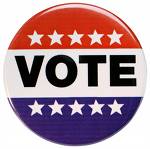Voting “with our Backsides”. This November’s Election of a New Congress

I just got back from two weeks in Germany on Sunday evening. The lady sitting next to me on the airplane said, “Be sure to vote.” I replied, “I do indeed intend to — as we Irish say, ‘With our backsides.”
I explained that I live in New York and there’s nobody to vote for here. The New York Times says that if Sen. Reid loses in Nevada to the crazy lady, New York’s Senator Schumer will become Democratic Senate leader. Wall Street will have its lead lobbyist in charge of Obama’s financial policy.
But the problem goes much further beyond New York, of course. America has two parties. The Democrats are the “Yes” party, the Republicans are the “Yes, Please” party. And as in any democracy in today’s mass media age, they bid for campaign donors – Wall Street finance, insurance and real estate heading the list, along with Big Oil, monopolies and the military-industrial complex.
Then comes the packaging of the payoff. What Americans wanted in 2008 was change. So the public voted out the “Yes, Please” party. The indicated populist menu (“Column A” above) was headed by the word “Change.” But jut what kind of change was never spelled out, and in any case it turned out to be only the “demo” version. What voters got the Democratic “Yes” party – yes to Wall Street and its major debt customers.
So now, two years in, voters are so angry party that they are willing to throw out the “Yes” Party, even if it means voting back in the “Yes Please” Republicans. But the latter now has a budding Tea Party wing, flying under the banner of “Yes, Thank you.”
Not much of a choice, it seems. They’re all “Yeses” of one degree or another. Britain’s Public-Private Partnership still looms as the dress rehearsal for what we are getting into.
One can understand the populist opposition to Big Government associated with the enormous recent giveaways. Independents will “vote with their backsides” and stay home, while more angry voters seem to believe that the best way to stop the mess is to elect enough Republicans to put the Democrats into opposition.
It may even work help ward off the Thatcherite policy that Obama has defended. A Republican Congress no doubt will be glad enough to support the Transportation Infrastructure Bank giveaway. Will Democrats go along, now that they are becoming an opposition party once again?
It’s always easier to strike a moral stance when in the opposition. It looks like the Democrats are going back to their old sanctimonious position, hoping that in 2012 voters will elect the “Yes” party once again as less enthusiastic than “Yes, Please” or “Yes, Thank You.”

